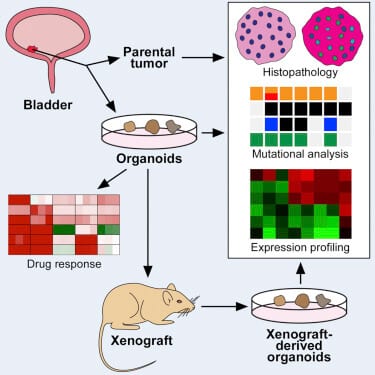Researchers were able to produce clusters of bladder cancer cells that mimic many of the characteristics of real tumors

[Translation by Dr. Nachmani Moshe]
Researchers have succeeded in producing bladder cancer cell clusters (organoids) that mimic many of the characteristics of real tumors. The use of these aggregates, which are three-dimensional spheroids taken from the patient's own tumor, may be effective in the future to guide the treatment of patients. The article, which describes the research done by researchers from Columbia University and New York University, was recently published in the scientific journal Cell.
In the field of precision medicine, molecular characterization of the cancer tumor of the individual patient is used to identify genetic mutations responsible for the proliferation of the cancer. The knowledge derived from this idea can help doctors choose the most appropriate and best medicine to fight cancer, although the tests do not always predict how the patient will respond to the specific treatments. "The main advantage of organoids lies in the fact that they are actually precise extensions of the tumor in the body," explains the lead author of the article Professor Michael M. Shen from Columbia University. "When we have these customized laboratory models, which we can prepare in a few weeks, we can test several different drugs on the tumor and thereby provide personalized medicine to people with bladder cancer. The main challenge in creating any type of organoid is determining the unique composition of nutrients, growth factors and tissue culture methods that will convert the patient's tumor cells into tiny tumor organoids in a Petri dish. The exact conditions may vary from one type of cancer to another.
In the current study, the organoids were created from tumor cells of 22 bladder cancer patients. The clusters, which can reach a diameter of one millimeter, are similar in their characteristics to tumors in the patient's body and include many of the same molecular and genetic features. In particular, the organoids developed genetic changes within them that occurred over time, a phenomenon known as 'clonal evolution'. This phenomenon is one of the reasons for the development of cancer and drug resistance. It is very difficult to develop an accurate model of a solid tumor," said the lead researcher. With the help of these samples, we will be able to examine how bladder tumors develop and perhaps also understand how we can prevent them from becoming resistant to treatments." "Our mechanism paves a new way to test the molecular mechanisms related to drug response and drug resistance." Bladder cancer is the fifth most common cancer in the US, and at the same time it is one of the most difficult to understand since there are a small number of bladder models that faithfully reflect the biology of the disease, so creating clusters of cells of this disease is a significant advance. In the end, the experiments with these clusters will allow us to develop new treatments for the disease that will be much more effective than those that exist today.
The researchers plan to test the predictive abilities of the clusters in "co-clinical" experiments in which both the patients and the clusters corresponding to them are treated with the same drug. "Experiments of this type will be able to determine whether it is possible to use the aggregates in order to obtain a reliable prediction as to how an individual patient will respond to a specific treatment," explains the lead researcher. "Today, it is very difficult to determine in advance exactly which drugs will be the most effective for a given patient."

One response
Enough, the era of chemotherapy is already over, it is a primitive and ineffective method
It's time to move into the 21st century to more advanced and efficient methods.
Good Day .